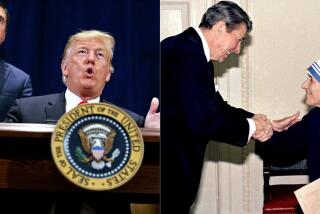Gingrich Is an Easy--and Wrong--Target
- Share via
Perhaps we should stipulate at the beginning that Newt Gingrich, at least the Newt Gingrich we saw in public, was not a terribly likable man. Nor a very popular one, even as his ideas brought him to power in 1994 and helped reelect his party to control of the House in 1996 and 1998. Yet Gingrich’s ideas, which were the foundation of what was once called the “Republican Revolution,” are now at the center of a political discussion that distorts both his own record and that of the Republicans he led.
“Too often, my party has focused on the national economy, to the exclusion of all else, speaking a sterile language of rates and numbers,” GOP presidential front-runner George W. Bush said earlier this month in a speech to the Manhattan Institute. “Too often, my party has confused the need for limited government with a disdain for government itself.”
There seems to be little doubt that Bush’s words were aimed directly at Republicans in Congress and their now-deposed, unlamented speaker.
So when did Gingrich focus on the national economy to the exclusion of all else? Perhaps Gov. Bush and his advisors were busy on Jan. 4, 1995, when the speaker, at his swearing-in ceremony, told the House: “The balanced budget is the right thing to do. But it doesn’t, in my mind, have the moral urgency of coming to grips with what’s happening to the poorest Americans. I would say to those Republicans who believe in total privatization, you can’t believe in the Good Samaritan and explain that, as long as business is making money, we can walk by a fellow American who’s hurt and not do something.”
And perhaps the Bush team was busy on the dozens of occasions that Gingrich enthusiastically told Republicans--and everybody else--to read Marvin Olasky’s “The Tragedy of American Compassion.”
Olasky, now an advisor to Bush, was described in a recent New York Times article as the man widely regarded as the godfather of “compassionate conservatism.” Yet he was also the godfather of some of Gingrich’s best ideas.
There were times when Gingrich-watchers wondered if he would ever not mention Olasky’s book. Or when he would not talk up his dream of an opportunity society from which all Americans would benefit.
When did Gingrich confuse the need for limited government with a disdain for government itself? Probably not when, days after his election in 1994, he called for “limited but effective government.” Or the scores of times afterward that he proposed some variation of a “strong, efficient, effective, limited government.” Or the many times he spoke--shades of Al Gore!--about making each federal agency “the best government institution of its kind anywhere on the planet.”
Looking back over Gingrich’s public statements, it is hard to pinpoint the disdain for government itself that so worries Bush; to find it, one has to go back beyond Gingrich to the most revered Republican of all, Ronald Reagan, who made famous his pronouncement that “government is the problem.”
Then there was Bush’s third criticism: “Too often, on social issues,” he said, “my party has painted an image of America slouching toward Gomorrah.” Logically, that appears not to apply to those who focused on the national economy to the exclusion of all else. In any event, it doesn’t accurately describe Gingrich’s positions. While the speaker, for example, declared the problem of youth violence a moral crisis in much the same way that President Clinton and every other leader did, and while he spoke of the destructive effects of welfare in much the way that the president and every other leader did, he used those criticisms to promote the “opportunity society,” which was a fundamentally optimistic concept.
All of this makes one wonder why Bush is at least implicitly convicting Gingrich and congressional Republicans of crimes they didn’t commit. You’d have to ask him--or his pollster.
While his strategy is understandable--opinion surveys at the moment suggest that he would be crazy to go around the country singing the praises of Newt Gingrich--an honest look at the record also suggests that he not set up the Republican Congress as a straw man to be knocked down for an approving public.
More to Read
Get the L.A. Times Politics newsletter
Deeply reported insights into legislation, politics and policy from Sacramento, Washington and beyond. In your inbox twice per week.
You may occasionally receive promotional content from the Los Angeles Times.










